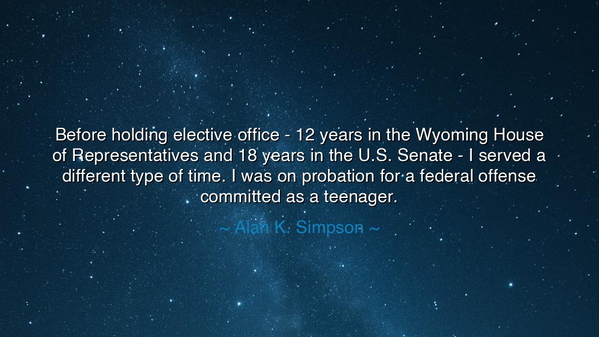
Before holding elective office - 12 years in the Wyoming House
Before holding elective office - 12 years in the Wyoming House of Representatives and 18 years in the U.S. Senate - I served a different type of time. I was on probation for a federal offense committed as a teenager.






Hear the words of Alan K. Simpson, who confessed with candor and humility: “Before holding elective office—12 years in the Wyoming House of Representatives and 18 years in the U.S. Senate—I served a different type of time. I was on probation for a federal offense committed as a teenager.” These words carry the weight of honesty and the spark of redemption. They tell not only the tale of a man, but of the long journey from youthful error to honorable service, from shame to responsibility, from brokenness to leadership.
At their heart, these words remind us that the path of life is not straight nor unblemished. Even those who later rise to greatness often begin in weakness. The boy who strays, who falters, who falls into offense may yet become the man who stands tall in the halls of power. Probation, in this story, is not merely punishment but the crucible in which humility was forged. By facing his errors, Simpson was prepared for the greater weight of public duty. Without the dark beginning, the bright end would not shine as deeply.
The ancients knew this pattern well. Consider the tale of St. Augustine, who in his youth pursued indulgence and vice, only later to become one of the greatest minds and saints of the Church. His early errors gave depth to his later wisdom. Or think of Moses, who fled into the desert after committing violence, yet returned to lead his people to freedom. In the same way, Simpson’s early probation became the wilderness from which he emerged tempered, ready to shoulder the burden of representing his people.
This story is also a reminder of the power of second chances. A society that condemns forever those who falter in youth deprives itself of future leaders, artists, and servants. For what better qualification to lead than to know firsthand the weight of error, the sting of consequence, and the possibility of renewal? Simpson’s journey proves that redemption is not only personal but communal: his later service was repayment of the debt he owed, his proof that one can rise above the chains of one’s past.
Yet there is also warning here. For not all who stumble rise again. Many are broken beneath their mistakes, many are denied the chance to prove themselves anew. Thus Simpson’s words remind us that mercy and justice must walk together. Probation gave him a chance to make amends rather than to be destroyed by his error. Without such grace, his story might have been one of ruin instead of renewal.
The lesson is clear: do not despise your past errors, nor hide them in shame, but let them become the teachers of your soul. Acknowledge them, learn from them, and build from them a life of integrity. Likewise, when you see others falter, do not condemn them forever, but consider that within them may lie the seeds of future greatness. To be merciful is to give space for transformation, and to be humble is to never forget the path from which you came.
So let your action be this: if you are burdened by past mistakes, let them not chain you, but use them as stepping-stones to rise higher. If you are in a position of judgment over others, temper justice with compassion, for today’s offender may be tomorrow’s servant of the people. And if you rise to leadership, do so with humility, remembering—as Alan K. Simpson remembered—that the noblest service often begins in the ashes of youthful error.
For the true mark of greatness is not a life unbroken, but a life rebuilt. And so, the man who once walked under the weight of probation came to walk in the halls of the Senate, proving to all that failure does not write the last word—redemption does.






AAdministratorAdministrator
Welcome, honored guests. Please leave a comment, we will respond soon